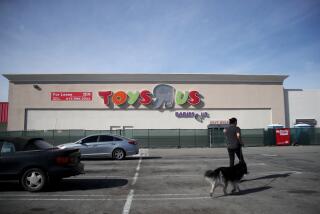The CEO Who Put His Firm Into Play : Shaking Things Up Comes Easy to RJR Nabisco’s Ross Johnson
- Share via
In the past two years, more than a few longtime employees of RJR Nabisco have felt as if they had been hit by a cold wind from the north that blew into town, tossed everything around and left everybody shivering in its path.
Many of those employees are no longer on the payroll of what had been considered a comfortable place to work, and others don’t hold the same job, thanks to staff cuts and reorganizations ordained by F. Ross Johnson, the Canadian-born, 56-year-old president and chief executive of the giant food and tobacco concern.
For the record:
12:00 a.m. Oct. 26, 1988 FOR THE RECORD
Los Angeles Times Wednesday October 26, 1988 Home Edition Business Part 4 Page 2 Column 2 Financial Desk 1 inches; 23 words Type of Material: Correction
The number of RJR Nabisco shares owned by Chief Executive F. Ross Johnson was misstated in Tuesday’s editions of The Times. Johnson is the owner of 235,535 RJR shares.
But today, RJR Nabisco shareholders may be feeling less of a cold wind than a warm glow from Johnson, the former accountant who has increased the value of their shares 50% practically overnight. Johnson’s feat promises an even bigger payoff for those who stick around to see if takeover specialist Kohlberg Kravis Roberts & Co.’s $90-a-share offer for the company, unveiled Monday, comes to fruition. At $20.3 billion, the deal would be the nation’s largest corporate takeover.
Johnson, who made about $1.7 million last year as RJR’s top executive, will do well personally by selling his own estimated 60,000 shares of RJR holdings, said Joseph C, Frazzano, an analyst with Oppenheimer & Co. in New York. Additionally, Kohlberg Kravis does not have a history of turning out the management of companies it acquires. Thus, Johnson is almost certain to retain power, with the added freedom of operating a private concern.
Whether or not Kohlberg Kravis acquires the company, most analysts now believe that RJR will eventually be bought by someone. And it was Johnson who put the company “in play” with a bold move that was typical of the swift and decisive actions he has taken since he was named RJR’s president and chief executive two years ago. In declaring late last week that his management group was considering a buyout at about $75 a share, Johnson tacitly invited a takeover, according to analysts.
The announcement last week was typical of Johnson’s ability to quickly change direction and seize opportunity. Just weeks ago, Johnson was trumpeting the company’s plans to grow internally from such improvements as a new, efficient baking operation and a huge investment in the so-called smokeless cigarette.
“We’re prepared to move 180 degrees in a hurry,” Johnson told Fortune magazine recently. Johnson was not available to be interviewed for this article. In the Fortune interview, he referred to the necessity of reorganizing internally when things aren’t working. However, the leveraged buyout proposal also demonstrated that Johnson is attuned to outside forces that could threaten the company.
The plan to grow internally was made before it was apparent that food companies had become “hot” on Wall Street. (Philip Morris offered a whopping $11.8 billion for Kraft just before Johnson surprised Wall Street with his suggested management buyout of RJR.)
For RJR, once known as a rather stodgy tobacco company, Johnson’s tenure has offered one surprise after another. He didn’t officially take the helm as chief executive until Jan. 1, 1987, succeeding J. Tylee Wilson, the chairman and chief executive who was in charge when R. J. Reynolds Industries bought Nabisco Brands in 1985.
In reality, Johnson’s growing influence was apparent months before, when the company’s board seemingly speeded up Wilson’s timetable for retirement. Johnson had been named chief operating officer when the two companies merged.
In his first month as RJR’s chief executive, Johnson shocked Winston-Salem, N.C., with the announcement that RJR was pulling its headquarters from the area so intricately linked with tobacco for a shiny new home in Atlanta. The next day, he announced the $1.2-billion sale of RJR’s Heublein wine and liquor business.
Johnson’s ascension at RJR wasn’t the first time he wound up in the driver’s seat when his company merged with another. Johnson moved swiftly up the ranks of Standard Brands after joining the Canadian subsidiary as an executive vice president in 1971; when Nabisco merged with Standard Brands in 1981, Johnson was named chairman of the new company.
Described by associates as a decisive, outspoken person of sophisticated tastes, Johnson is said to have succeeded because of his ability to absorb lots of information and, in no small measure, the sheer force of his personality.
He was born in Winnipeg and was graduated from the University of Manitoba before he received a master’s degree in business from the University of Toronto. His early professional career was in marketing, an area in which he proved adept at shoving past food competitors in the never-ending war for supermarket shelf space and market share.
Main story, Part 1, Page 1
More to Read
Inside the business of entertainment
The Wide Shot brings you news, analysis and insights on everything from streaming wars to production — and what it all means for the future.
You may occasionally receive promotional content from the Los Angeles Times.








